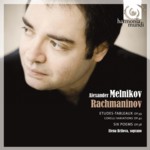Alexander Melnikov’s extraordinary 2006 Scriabin recital for Harmonia Mundi whetted my appetite for a follow-up. My wish came true big time. Here Melnikov delivers some of the most intelligently musical and technically impressive Rachmaninov interpretations I’ve ever heard. If the Op. 39 Etudes-Tableaux’s complex, swirling textures evoke a full orchestra, Melnikov figuratively divides that orchestra into highly colorful and responsive chamber groups that keenly listen to and play off each other. No matter how thick the writing, Melnikov emphasizes line over mass and carefully scales Rachmaninov’s dynamics so that the climaxes carry maximum structural and visceral impact. Furthermore, Melnikov’s freshly minted inner voices, smoldering accents, hair-trigger articulations, and character-driven rubatos always stem from what the composer actually wrote on the page.
For example, many pianists pile through No. 4 (B minor), yet Melnikov takes the composer’s Allegro assai seriously, allowing the elaborate contrapuntal repartee breathing room without sacrificing one iota of the music’s marching momentum. And the pianist’s immaculately balanced chords and impeccable rhythmic timing in No. 7 (C minor) easily justify his uncommonly measured pacing.
Melnikov proves no less amazing in the Corelli Variations, where his ideal tempos and subtleties of touch reach levels of expressive refinement that match and often surpass this work’s finest recorded versions. Soprano Elena Brilova’s voice has an inherently pretty quality that’s right for Rachmaninov’s Op. 38 songs, yet her persistent wobble is the cross one must bear en route to Melnikov’s incandescent accompaniments. For this reason alone I must shave a point from what otherwise would have been a “10/10” knockout. [3/7/2008]
































